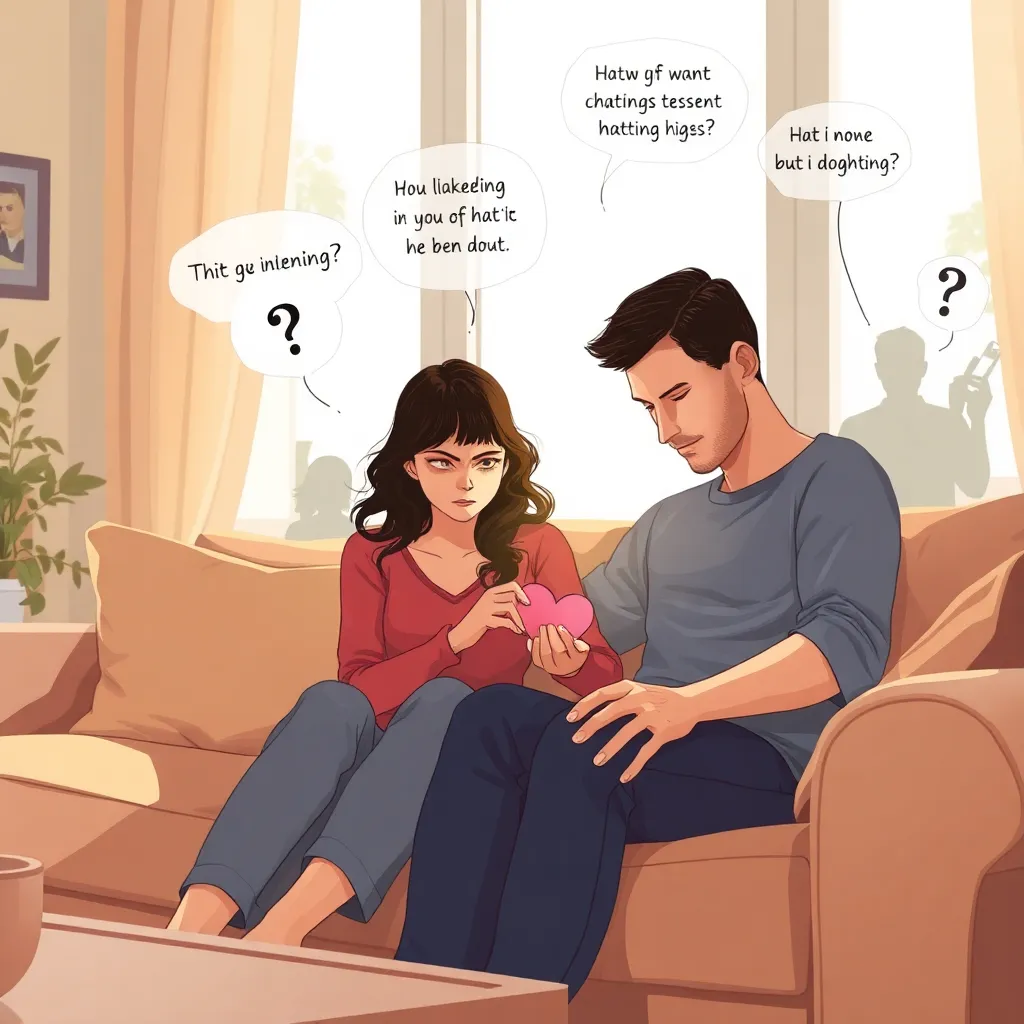Struggling with self-doubt can feel like walking through a dense fog, where every step is uncertain and every decision riddled with hesitation. It’s a deeply personal journey that affects your confidence, relationships, and overall well-being, leaving you questioning your worth at every turn. Understanding the signs that contribute to this pervasive self-doubt is crucial, not just for awareness, but for reclaiming your sense of self and empowerment.
The importance of recognizing these signs lies in breaking the cycle of negative thinking that can undermine your happiness. By identifying the subtle yet devastating signals that create self-doubt, you empower yourself to take proactive steps towards a healthier mindset. In this article, you’ll uncover ten specific signs often overlooked, yet capable of eroding your self-esteem over time.
As you read on, you’ll learn how to spot these signs in your daily life and understand their impact on your emotional and mental health. Each insight is designed to equip you with practical strategies to counteract doubt and build resilience. With a little guidance and self-awareness, you can begin to foster a more compassionate and confident relationship with yourself, creating space for positivity and growth.
1. Frequent Withholding of Affection

In many relationships, the withholding of affection can be a subtle yet powerful tool that creates self-doubt. When a partner frequently pulls away just when you need comfort or support, it can leave you feeling unworthy and insecure.
An example might be a partner who stops being affectionate after a disagreement, using silence as a form of punishment. This behavior can make you question your own value and whether you are deserving of love and attention.
Experts suggest that this is often a form of emotional manipulation used to maintain control in the relationship. When affection is withheld, it can create a sense of dependency on the partner’s approval, causing deeper self-doubt.
Ultimately, recognizing this pattern is crucial to addressing the issue and fostering a healthier, more balanced relationship. Understanding these dynamics can empower you to seek the respect and love you truly deserve.
2. Constant Comparison to Others

Being constantly compared to others can severely undermine one’s self-esteem. This practice often leads to feelings of inadequacy, as if no matter what you do, you’re never quite good enough.
Consider a scenario where your partner frequently highlights the achievements of a friend or colleague. While it may seem harmless, these comparisons can plant seeds of self-doubt and insecurity, making you question your own worth.
Experts suggest that such comparisons are often more about the comparer’s insecurities than about the person being compared. It’s crucial to recognize that each relationship is unique, and comparing yourself to others is neither fair nor productive.
Building resilience against these comparisons involves reinforcing your self-worth and celebrating your individual strengths. Engage in open conversations with your partner about how these comparisons make you feel and work towards fostering a more supportive environment.
Ultimately, the goal is to cultivate a relationship where both partners feel valued and appreciated for who they truly are. Understanding and addressing constant comparison can transform your relationship into a space of mutual respect and admiration.
3. Dismissive of Your Achievements

Being dismissive of your achievements is a subtle yet powerful tactic that can erode self-esteem. When a partner downplays your accomplishments, it creates an impression that your efforts are insignificant, leading to self-doubt. Imagine sharing a well-deserved promotion at work, only to hear, “It’s not that big of a deal,” or “Anyone could have done it.” These remarks, though seemingly offhand, can make you question your own value and capabilities.
In many relationships, these dismissive comments are intended to undermine your confidence, ensuring you remain reliant on their validation. Over time, you might start questioning whether your achievements are truly noteworthy, leading you to seek approval more than satisfaction. Such scenarios can manifest when one partner feels threatened by the other’s success, aiming to keep the power dynamic tilted in their favor.
To counteract this, it is crucial to celebrate your successes independently and cultivate a support system that acknowledges your worth. Share your achievements with friends or family who genuinely appreciate your efforts, reinforcing your sense of accomplishment. As relationship expert Dr. Jane Parker notes, “Your partner should be your biggest cheerleader, not your harshest critic.”
Ultimately, every person deserves a partner who recognizes and celebrates their growth and accomplishments. If dismissiveness becomes a pattern, it’s essential to address it openly and assertively. In doing so, you reclaim your narrative and reinforce a foundation of mutual respect and support in the relationship.
4. Inconsistent Emotional Support

Inconsistencies in emotional support can leave you feeling as if you’re walking on a tightrope. One moment, your partner might shower you with affection, and the next, they are emotionally distant and unavailable. This erratic behavior can cause you to doubt your own needs and whether you deserve to have them met. Imagine being praised and cared for one day, only to feel ignored and unimportant the next.
Such unpredictability often leads to confusion and self-blame in relationships. You might find yourself wondering if you did something to cause the sudden withdrawal of affection. Over time, this can erode your self-esteem and make you question your worthiness of love and support. It’s crucial to recognize that consistent emotional support is a fundamental component of healthy relationships.
Experts suggest that communication is key in addressing these inconsistencies. Initiating open conversations about your emotional needs can help clarify misunderstandings and set expectations. When both partners are aware of each other’s emotional requirements, it can foster a more stable and nurturing environment.
Remember, it’s perfectly acceptable to expect reliability in emotional support from your partner. By addressing these issues together, you can create a more secure emotional foundation. Ultimately, a stable relationship offers a sanctuary where both partners feel safe to express their true selves without fear of judgment or abandonment.
5. Criticism Disguised as Jokes

In relationships, sometimes criticism can be wrapped in the guise of a joke, leaving you feeling unsure about how to react. Such remarks might seem lighthearted on the surface, but they can deeply undermine your self-esteem over time, making you question your worth and abilities.
For instance, if your partner frequently jokes about your career choices or personal habits, it might be their way of disguising genuine disapproval. This form of criticism can be particularly harmful because it is challenging to address without being accused of overreacting or lacking a sense of humor.
To navigate this, it’s essential to recognize when humor crosses the line into hurtfulness. Communicate with your partner about how these comments make you feel, and establish boundaries that respect your emotional well-being.
Experts suggest using “I” statements to express your feelings without sounding accusatory. For example, saying “I feel hurt when jokes are made about my job” helps convey the impact without placing blame.
Ultimately, a healthy relationship should feel like a safe space where mutual respect is paramount. By addressing disguised criticism, you can prevent self-doubt from taking root and instead cultivate a bond built on trust and understanding.
6. Blaming You for Their Issues

Another tactic that can deeply erode your confidence is when your partner starts blaming you for their issues. This behavior shifts the responsibility of their problems onto you, creating a sense of guilt that is both overwhelming and unwarranted.
Imagine a scenario where your partner consistently accuses you of being the reason for their stress at work. Over time, this can make you question your own actions and self-worth, even though their job performance is outside of your control.
In relationships, it’s important to recognize when you are unfairly carrying the burden of someone else’s mistakes or shortcomings. Instead of accepting this blame, engage your partner in a conversation about how these issues truly affect both of you and explore how you can support each other without assigning blame.
Experts suggest that healthy relationships are built on mutual understanding and accountability. Addressing problems as a team can strengthen your bond and prevent resentment from festering over time.
By refusing to accept misplaced blame, you empower yourself and set a standard for honest and empathetic communication in your relationship. Remember, a healthy partnership involves shared responsibility, where both partners strive to support each other’s growth without pointing fingers.
7. Undermining Your Decisions

Undermining your decisions can feel like a subtle erosion of your self-confidence. In a relationship, this might manifest as a partner constantly questioning your choices, making you second-guess your judgment. Such behavior is often cloaked in feigned concern or advice, making it harder to pinpoint the negative impact on your self-esteem. When your partner questions your every decision, it can lead to feelings of inadequacy and self-doubt.
Imagine planning a weekend getaway that you’re excited about, only for your partner to pick apart every detail, from the destination to the itinerary. This constant scrutiny creates an environment where you start to doubt your ability to make sound decisions. Over time, you might even find yourself relying on your partner to make decisions for you, which can erode your sense of independence. It’s important to recognize when advice becomes control disguised as concern.
Psychologists often emphasize the importance of maintaining autonomy in relationships. According to Dr. Jane Smith, a leading relationship expert, “Healthy partnerships thrive on mutual respect for each other’s decisions.” If you find yourself frequently doubting your choices, it might be time to set boundaries and reaffirm your confidence. By doing so, you take a crucial step towards regaining your sense of self and independence.
Ultimately, relationships should empower you to grow, not make you feel small. Remember, a partner who truly respects you will support your decisions, even when they disagree. By recognizing and addressing this behavior, you can foster a more supportive and balanced relationship. Embrace the journey towards a healthier dynamic where both partners feel valued and respected.
8. Gaslighting Your Experiences

Gaslighting your experiences is a subtle yet powerful way to make you question your own reality. It often involves someone repeatedly denying the veracity of your feelings, leading you to doubt your own perceptions. Imagine sharing a heartfelt moment with your partner, only to be told later that it never happened or wasn’t as you remembered. Over time, this can erode your confidence in your own memories and emotions, causing you to rely more on their version of events.
In relationships, this tactic can appear as innocent forgetfulness or miscommunication. However, when patterns emerge where your partner consistently contradicts your experiences, it’s a red flag. For instance, if you recall a disagreement and your partner insists it didn’t happen, it’s important to trust your instincts. Recognize that your feelings and memories are valid, and seek to address these discrepancies openly.
Experts suggest that maintaining a journal can be an effective tool to combat gaslighting. Documenting events as they happen helps reinforce your trust in your experiences when faced with denial or manipulation. Additionally, discussing these issues with a trusted friend or therapist can provide external validation. This support can be invaluable in reaffirming your sense of reality and self-worth.
Ultimately, understanding the impact of gaslighting empowers you to set boundaries and seek healthier interactions. By identifying this behavior, you can take proactive steps to protect your emotional well-being. Trusting your own experiences is crucial in maintaining a balanced and respectful relationship. Remember, your perceptions are valid, and you deserve to be heard and respected.
9. Ignoring Your Needs and Wants

When someone consistently ignores your needs and wants, it can lead to a profound sense of self-doubt and insecurity. Picture this: you express a desire for more quality time together, and your partner brushes it off as unimportant. This dismissal can make you question whether your needs are valid or worthy of attention. It’s crucial to recognize this behavior as a tactic that undermines your confidence.
In healthy relationships, both partners actively strive to understand and meet each other’s emotional and practical needs. An example might be a partner who eagerly listens when you discuss your career aspirations, offering support and encouragement. Such behavior reinforces your sense of self-worth and importance in the relationship. Ignoring your needs, conversely, can foster an environment where your desires feel secondary or even invisible.
Experts suggest that openly communicating your needs is a vital step in reclaiming your confidence and autonomy. Consider setting aside time to have a candid conversation, where both partners can express what they need to feel valued and supported. This dialogue can help dismantle patterns of neglect and foster a more balanced relationship. Remember, your needs are just as significant as your partner’s, and they deserve to be heard and respected.
Ultimately, a relationship where your needs are disregarded is one that chips away at your self-esteem. By voicing your needs and creating space for mutual understanding, you empower yourself and strengthen the relationship. This approach not only builds a more equitable partnership but also reinforces your inner conviction that your needs matter.
10. Conditional Displays of Love

In relationships where love feels like it comes with strings attached, one partner may only express affection when the other meets certain expectations or demands. This can lead to a persistent feeling of inadequacy, as if love is a reward for being someone you’re not.
Imagine a scenario where compliments and affection are only given when you adhere to specific standards set by your partner. Over time, this can erode your self-esteem, making you doubt your worthiness of unconditional love.
Experts note that this behavior often stems from a desire to control, making love seem contingent rather than constant. When love feels conditional, it becomes a tool for manipulation rather than a source of comfort and security.
To combat this, reflect on the nature of love in your relationship and communicate your need for unconditional support. Understanding and identifying these patterns can empower you to seek healthier dynamics.
Ultimately, love should never feel like a transaction. Seek relationships that nurture your true self and embrace you without conditions.
Conclusion: Creating Beautiful Outdoor Spaces
In navigating the intricate dance of relationships, recognizing the signs that breed self-doubt is crucial. This article shed light on ten pivotal warning signs: constant criticism, gaslighting, emotional withdrawal, inconsistency, dismissive behavior, lack of support, undermining achievements, excessive jealousy, manipulative apologies, and isolation from loved ones. Understanding these behaviors empowers you to confront and address them, paving the way for healthier interactions.
As your next step, take a moment to reflect on your relationship dynamics. Identify any signs that resonate and initiate an open conversation with your partner about your feelings and observations. Communication is the cornerstone of resolution and growth.
Remember, a fulfilling relationship is within reach when you prioritize mutual respect and understanding. Bookmark this article as a valuable resource to revisit as you navigate your journey to a healthier connection.
Looking ahead, embracing awareness and proactive communication can transform challenges into opportunities for growth. Your path to relationship success is paved with informed choices and compassionate actions. Save this article as your go-to guide for fostering a supportive and empowering partnership, and take the first step today towards a more confident and fulfilling relationship.
